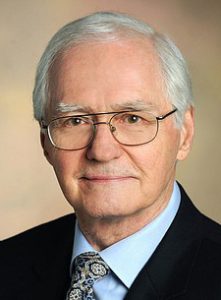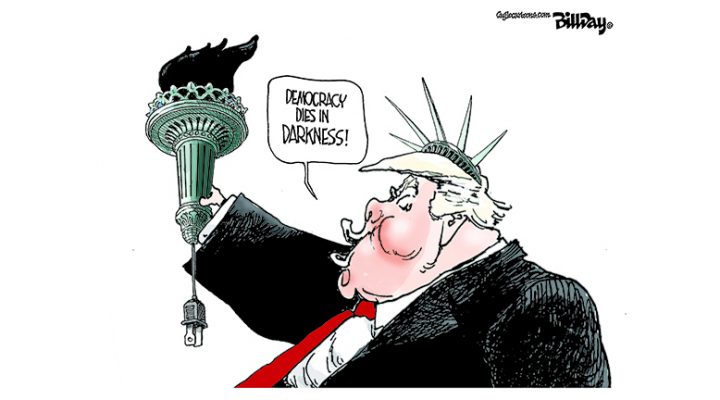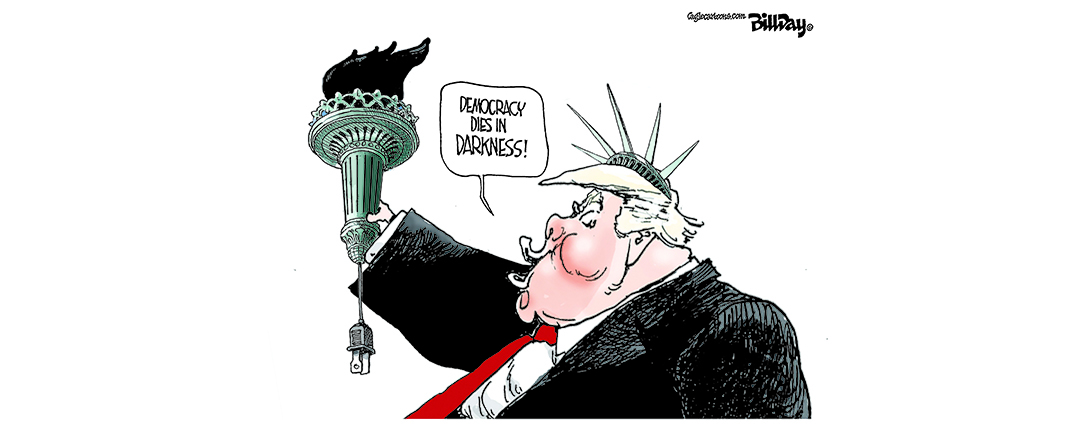Democracy dies in darkness. Sure enough: in the absence of a free press to throw light on the actions and decisions of our political leaders, we the people are left in the dark. We don’t know what they decided, what they did or why they did it. And so they can do as they like.

Richard Conville
The phrase “democracy dies in darkness” has now become a call to arms for courageous political reporting. It was first used by Bob Woodward of the Washington Post in 2007. With Donald Trump’s rallying cry that members of the media are enemies of the people and his constant ridicule of them, many also see the phrase as a somber warning of what could come were the ex-president to be elected again.
But there’s quite another view I also find useful for navigating the current political landscape. It’s found in a book review essay by Adam Gopnik in the current issue of The New Yorker and concerns the new book Takeover: Hitler’s Final Rise to Power by historian Timothy W. Ryback.
Ryback focuses on the year that sealed Hitler’s rise to power, 1932, and the enablers who made that possible. Their actions are a textbook example of the first line in Timothy Snyder’s small but powerful book, On Tyranny: “Most of the power of authoritarianism is freely given.”
“Most of the power of authoritarianism is freely given.”
The Republican Party has given itself over to Donald Trump. It started in 2016 when the Republican National Committee chose to forego crafting a party platform. Today, the face of the Republican Party is Donald Trump. You see what happens to those who resist him: think Liz Cheney, Adam Kinzinger, Mitt Romney, Mike Pence. All the rest have freely given their power to Trump.
But analogies to Hitler’s rise to power are too far-fetched for most voters. For many readers of this column, a far more familiar and recent “takeover” story is about the Southern Baptist Convention.
I was reminded of this when I recently ran across a newspaper clipping tucked inside the front cover of a book in my library. The book is The New Crusades, The New Holy Land by historian David Morgan, and the clipping is a review of the book published in The Hattiesburg American in late 1998. The book chronicles the takeover of the SBC by the fundamentalist wing of the denomination.
The wedge issue that was skillfully used to affect the takeover was “biblical inerrancy,” the belief that the original writings that became the Bible were and are without error in any way.
Says the reviewer, Clayton Sullivan: “Morgan’s book makes clear that the fundamentalist takeover was successful because more ‘First Baptist Church’ ministers chose to be bystanders. Similarly, scores of sophisticated Baptist laypersons refused to become involved in the controversy (viewing it as a ‘preachers’ fight’).”
See the pattern? “Chose to be bystanders” and “refused to become involved.” Nothing new here. In the 18th century, English statesman Edmund Burke observed, “The only thing necessary for evil to triumph in the world is that good men do nothing.”
It’s quite a frightening notion, actually. First, it’s a call to participate, especially in a democracy; but second, it’s a mandate to decide — to decide what the “evil” is and who “the good men” are. So it hardly solves anything. Nevertheless, it sounds a warning and calls for action.
Back to Ryback’s book on Hitler in the year 1932. That was 92 years ago. The takeover of the SBC was sealed in 1992, 32 years ago. But the same pattern was at work in both: Too many people, mostly people of good will and with the best of intentions, “chose to be bystanders” and “refused to become involved.”
So hear reviewer Adam Gopnik’s answer to democracy dies in darkness: “Democracy doesn’t die in the darkness. It dies in the bright afternoon light” for all to plainly see: the Republican Party has handed over its power to Donald Trump. He didn’t take it. It was freely given. In broad daylight. For all to see.
In this hotly contested political year, the decisions are the same, whether 1932 or 1992 or 2024: Shall I become involved? And which side am I on?
This time, the issue is momentous in a new and larger way: Will the United States of America continue as a democracy, or will it be ruled by a tyrant?
Richard Conville is a retired professor of communication studies and long-time resident of Hattiesburg, Miss. This column was published in the April 4 issue of The Pinebelt News, Hattiesburg, Miss.
Related articles:
The Christian case for democracy | Analysis by Mark Wingfield
Most Americans believe democracy is at risk in 2024 — but for different reasons
Things fall apart. Is democracy one of them? | Analysis by Erich Bridges


